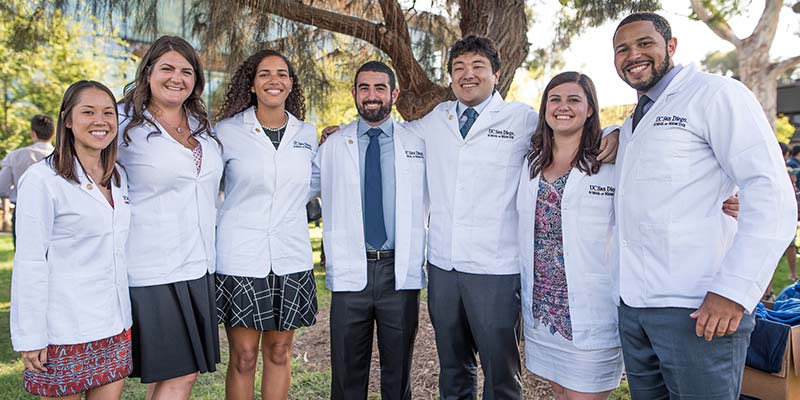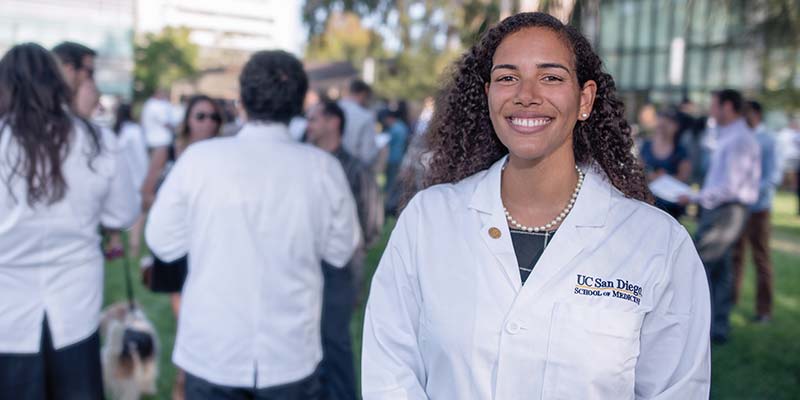17 September 2015
Program helps students gain entry into medical school
Seven students from premedical program among incoming class at UC San Diego School of Medicine
When the University of California, San Diego School of Medicine welcomed its new class on Friday, Sept. 4, 2015 with its traditional “white coat” ceremony, seven students had taken a different route to gain admission to this select group.

These seven students all participated in the UC San Diego Post Baccalaureate Premedical Program, which UC San Diego Extension oversees and runs. The program is designed to help prospective medical students enhance their academic records with a year-long course of study that offers advanced science classes, test preparation, application assistance and one-on-one mentoring.
Because it is part of the mission of UC San Diego School of Medicine to improve health care in underserved communities, the program focuses on students from socioeconomically disadvantaged populations as well as students who are interested in providing health care in underserved communities. Around 50 percent of the students in the UC San Diego Post Baccalaureate Premedical Program are considered to be socioeconomically disadvantaged, said Grace Miller, director of the Healthcare and Behavioral Sciences department at UC San Diego Extension.
The Post Baccalaureate program, which was launched three years ago, is part of a growing trend as potential medical students look for an edge in the increasingly selective process. In 2013, for instance, nearly 58 percent of medical school applicants were denied admission to any medical school. Because of that, there has been an almost 50 percent increase in the existence of these Post Baccalaureate, or Post Bac, programs since 2009, with approximately 140 schools now offering them.
Miller said the UC San Diego program provides a unique experience both through its mentoring and by creating strong bonds within each class of the year-long program.
“Each class, or cohort, starts together and finishes together. By studying and working so closely together, the students in our program are able to create a support system as they go through the grueling process of preparing to apply to medical school,” Miller said.
Dr. Carolyn Kelly, associate dean for admissions and student affairs at the UC San Diego School of Medicine, said the collaborative spirit of the UC San Diego Extension Post Baccalaureate Premedical Program also reflects the changing nature of medical education. In the past, the focus was more on individual achievement but now doctors are expected to work well in teams.
“The practice of medicine is now a team sport,” Kelly said. “This program emphasizes that message and teaches the students how to work together.”
Sarah Watler, one of the incoming UC San Diego medical students from the program, said the camaraderie she had with others in the program was just one of its many benefits.
“I was also able to build strong relationships with the students and faculty at the UC San Diego School of Medicine, which has given me a sense of comfort and feelings of "coming home" now that I will officially be attending the medical school as a student,” Watler said. “This program was an essential piece to my growth as a student and in my capacity to persevere should any challenges in medical school arise.”
For Kiana Choo, the Post Baccalaureate Premedical Program gave her a second chance at her dream of becoming a doctor. Choo said she struggled during her freshman and sophomore years as she adjusted to college and that held her back when she first applied to medical school. After working in the community as an HIV tester and counselor, Choo decided she was ready to re-apply to medical school but knew she needed help boosting her science GPA and preparing for the MCAT. She credits her participation in the program to her securing 13 interviews at medical schools and being accepted in UC San Diego School of Medicine, her first choice.
“Although my journey towards getting into medical school took longer than I originally hoped, I am grateful that I was able to take the time to fully prepare for the commitment of studying to become a physician” Choo said. “I feel completely ready to start my medical school journey and most of my confidence was instilled in me by this program."
Kelly added that the focus of the UC San Diego Post Baccalaureate Premedical Program also helps the School of Medicine in its effort to provide quality health care to the underserved because the program screens for students who want to focus on those communities.
“For us, the program educates students who can potentially help us deliver on our mission,” she said.

Getting into the Post Bac program can be challenging in its own right. The 2015 year’s class, which started in June 2015, had 32 students from a pool of 220 applicants. To be considered for the program, applicants need a minimum science GPA of 2.8 as well as community involvement and, if possible, experience in scientific research. Members of the 2013-2014 UC San Diego Post Baccalaureate Premedical Program also have been accepted at a variety of medical schools including UCLA, UC Riverside, Michigan State and Stony Brook in New York.
For more information about the Post Baccalaureate Premedical Program, visit http://postbacpremed.ucsd.edu/.